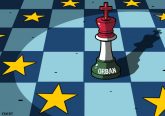Despite the fact that other countries of the Western Balkans are already part of NATO and the EU, Serbia is pursuing close ties both with Eastern and Western powers. Ana Brnabic, Serbia’s Prime Minister, has stated that “Serbia should not be asked to choose between the West and Russia.” According to her, Serbia is pursuing a “balanced foreign policy.” Such a policy is not necessarily new, as during the Cold War, the former Yugoslavia cooperated with both the East and the West. But in today’s contentious geostrategic climate, such a “neutral” policy means precariously walking on a tightrope bedeviled by pitfalls and competing interests.
The EU’s Increasingly Ambiguous Appeal
For centuries, Serbia has been Russia’s main ally in the Balkans. Because of the two countries’ close historical, cultural, and religious ties—the so-called “Slavic brotherhood”—Moscow has been able to maintain a strong foothold in the region. In the past decade, Russia has augmented its presence through soft power tools like diplomacy, energy deals, and other forms of trade.
Nevertheless, in March 2012, Serbia became an official candidate for EU membership and started to harmonize its domestic and foreign policies with the European Union. Serbia began European Union accession negotiations formally in 2014. Since then, EU officials have sent mixed signals about the potential of Serbia becoming a member of the EU. Two years ago, Jean-Claude Juncker said that there will be no new EU members during his tenure. In a European Commission White Paper on the future of Europe, there is no indication of potential EU enlargement until 2025.
The length of the arbitration process due to the changing requirements for the Balkan candidates, combined with the EU’s shifting policies regarding Kosovo, have stalled the talks. At the same time, joining the EU seems less attractive to many. The ongoing Eurozone crisis and Brexit have dampened enthusiasm of Western Balkan countries. The migrant crisis and the EU’s response have caused further alarm.
Russia’s Growing Influence
The inconsistent policies of the EU regarding Serbia and the western Balkans have flung the door wide open for Russia to expand its influence. In response to Western activity in Serbia, Russia has augmented its media presence in the country through Russia Today and Sputnik — infusing its own values and views across the region. Negative perspectives regarding the EU began to gain enough traction to increase hesitation and shift public opinion and Serbian policy.
These developments have caused concern for European officials. Federica Mogherini, the EU’s foreign affairs commissioner, has stated: “The concern is there and it is significant. Moscow’s presumable goal is to loosen the region’s connection to the EU and present Russia as an alternative to a dissolving union.” Theresa May called on her colleagues “to do more to counter destabilizing Russian disinformation campaigns and raise the visibility of western commitment” in the Balkans. And, David McAllister, Chair of the European Parliament’s Foreign Affairs Committee, stressed: “We are seeing a growing Russian influence… Russia was also exerting influence on political debate by organizing anti-western, and anti-EU propaganda.”
Economic Ties that Bind?
Moscow has also sought to increase its influence by deepening economic ties with Serbia. For instance, the “South Stream” project would have created a transit route for gas between the Western Balkans and Western European countries and bring thousands of new jobs, profits from the gas transit through the country, and greater energy security to Serbia.
Despite such highly visible economic projects, the country’s economy is more closely tied to the European Union than to Russia. According to the Statistical Office of the Republic of Serbia, in 2011, 57.6 percent of Serbia’s total exports went to the EU, compared to only 6.7 percent to Russia. Between 2005 and 2013, Russia was Serbia’s eighth-largest investor, making it a significant player but by no means the dominant economic force.
Yet, many Serbians believe that Russia plays a far larger role in the economy. As Johannes Hahn, EU Commissioner for Neighborhood Policy and Enlargement Negotiations, remarked: “A majority of Serbs still believe that Russia is the biggest investor in their country, when Austria alone invests four times more than Russia.” Despite this fact, Western countries have been unable to leverage their investments into political influence.
Kosovo: The Elephant in the Room
Aside from economic and cultural ties, part of the Serbian rationale for a close relationship with Russia and fraught one with the EU is the contested status of Kosovo. On the one hand, Russia has consistently supported Serbia’s policies in the international arena—both countries argue that international law was broken when Yugoslavia was bombed in 1999, leading to Kosovo’s recognition as a separate state in 2008. On the other hand, EU officials insist that “the EU must see a permanent, binding, sustainable and irreversible normalization of relations” with Kosovo. As Sigmar Gabriel, German Foreign Minister, stressed: “You have a responsibility to continue reforms and continue to develop better relations with Kosovo. That is an essential precondition for accession to the European Union.”
EU sanctions against Russia have also threatened the neutral stance that Serbia has historically maintained. The EU demanded Serbia impose sanctions during accession negotiations but offered Belgrade little in return. In addition to the economic damage such sanctions may cause, many in the country remember that it was the Soviet Union which came to their defense and rescued them from the horrors of Nazi occupation. Requiring Serbia to sanction its former liberators is a tough sell.
In sum, Serbia has been balancing the push and pull of East and West, navigating a razor-thin and ever-more contested line. The Western Balkans may be on the periphery for Russia and Western powers, but it is here that their rivalry clearly emerges. As John Kerry, the former U.S. Secretary of State, said the Western Balkan is “in the line of fire.” If history is a guide for what is to come, Serbia will likely continue trying to balance its political, economic and cultural ties with both the East and West. Whether walking this tightrope succeeds or fails, only the future can tell.






